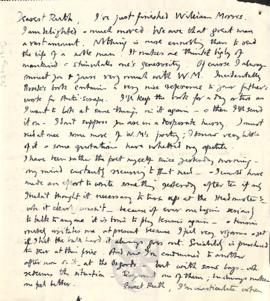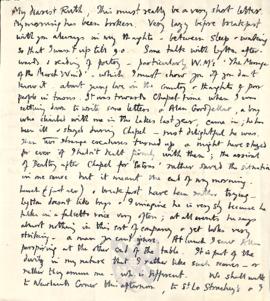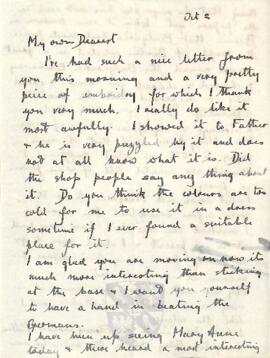Letter to Ruth Turner, written from Charterhouse School [Ruth was in Ireland with her family]
Had finished reading William Morris and was delighted and much moved by it. He associated her family with William Morris and there was a very nice reference to her father’s work in the book. He would send the book on to her. He wanted to look up some of William Morris’s poetry as he knew very little of it.
He had been writing poetry but had to stop and go to the Headmaster’s house [Frank Fletcher]. He couldn't talk seriously to anyone as it was always time for tennis. Tennis was irritating because when he hit the ball hard it always went out.
His last letter was ridiculous which he didn't mind as it was good for her to have someone to laugh with as she appeared to be deliciously solemn at moments. He was much too conceited ever to envy a cricketer. He only envied the poets. He was glad that the sonnet he wrote [See: PP/GM/1/1/1914/2] meant something to her.
The boys were being jolly. He describes Miss Pollock by practising a literary parody of Henry James. He describes a thunderstorm which occurred during the night and was still on his mind as he read the great third act of King Lear to his Form. Explains his interest in Lear and asks her to read some of John Keats’ letters.
Was expecting his friend Lytton Strachey to arrive and stay the night. He was very queer to the world but not to him as they were friends but he must be very irritating to many people. He had a profound respect for his intellect and passion with which he held the doctrine of freedom. His love for him as a man of intense feeling and fine imagination helped him put up with much that he wouldn't tolerate in others.
He had borrowed a copy of Poems by the Way by William Morris from the Clutton-Brocks. He thought they should buy the same edition as a wedding present. He loved what she said about money but he had only been about 1% serious in his previous letter which she would have known if she could have seen him talking. Money was comic and wholly irrelevant to him.
Wonders what wedding presents they might receive. The idea of possessions didn’t interest him unless he had some part in producing a beautiful whole with them. Avie and Harry [his sister and her husband Harry Longridge] had received 300 wedding presents, and his sister Mary would receive more. He had suggested to Mary that she could have all the ones they received that they didn’t want but she had refused the offer so he would have to get her a present.


